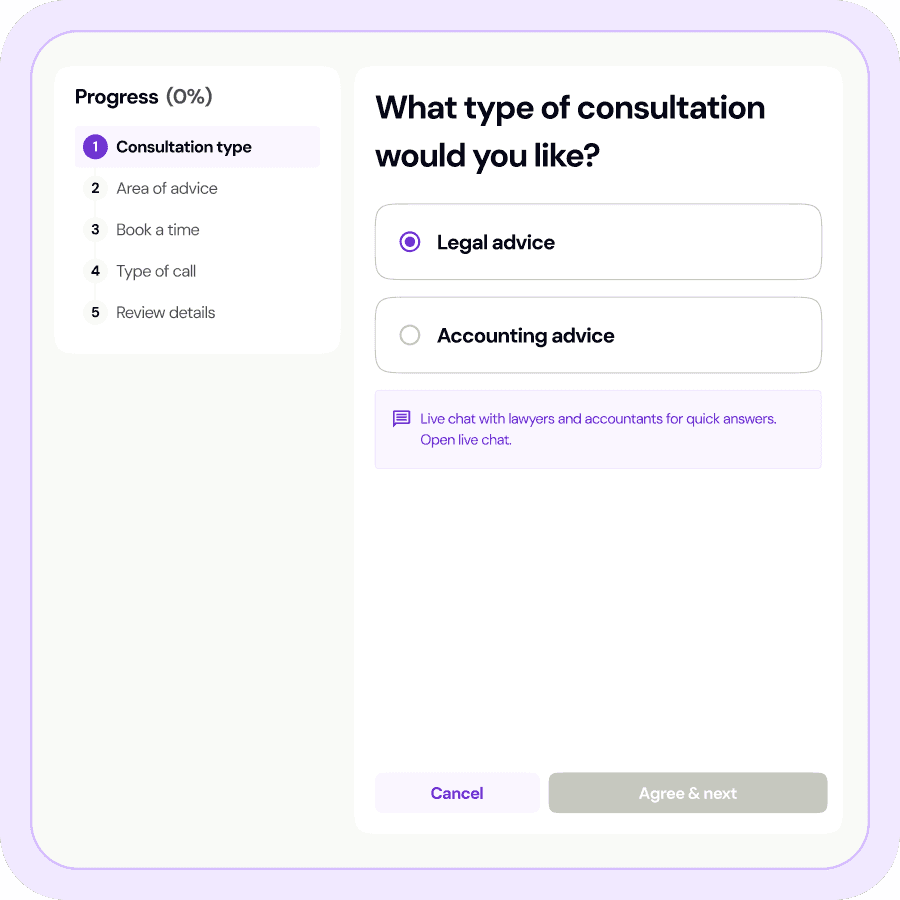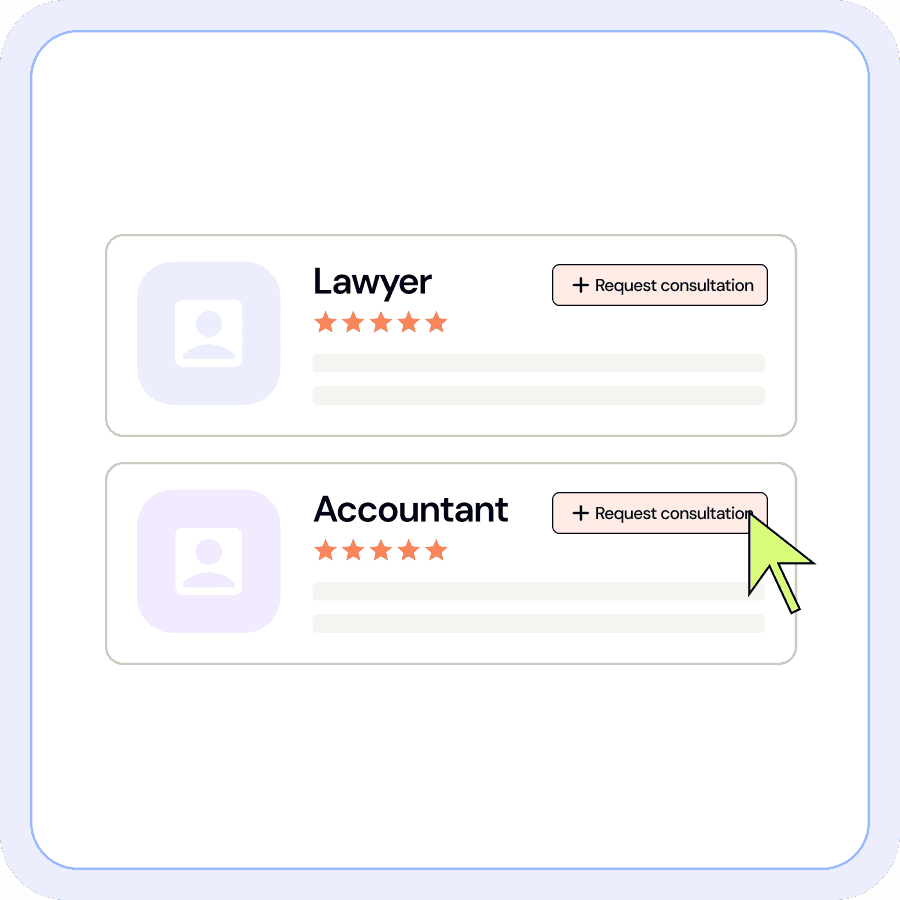From viral social media clips to blockbuster films and international Netflix series, every great piece of content begins with a production company turning creative ideas into reality.
Luckily for all the creatives out there, streaming platforms like TikTok, YouTube, and Instagram have created an insatiable demand for professional media content. This explosion in demand offers exciting opportunities for creative entrepreneurs ready to bring their storytelling to life.
However, creative talent alone isn’t enough to flourish. To truly succeed, establishing a solid business foundation is crucial. The legal side of starting a media production company includes choosing the right business structure, ensuring legal protections, and complying with regulations. It’s not glamorous, but it is essential and legally required.
That’s why platforms like Lawpath are invaluable in this journey. We provide tailored business registration services, legal document templates, and IP protection solutions that ease the complexities of business setup and management.
To start with, we’ve created this handy guide that will walk you through the essential steps to build a thriving film production company in Australia.
Table of Contents
Why start a media production company?
If you love storytelling and have a passion for video, starting a production company in Australia could be one of the smartest moves you make. The demand for video content is booming across the country — from snappy social media clips and commercials to documentaries and big events.
One of the best things about running a production company is the flexibility. Many projects are contract-based, meaning you can cherry-pick gigs that excite you and fit your schedule. Plus, with various revenue streams, from branded content and event coverage to documentaries and adverts, you can diversify your income and keep things interesting.
Now, freelancing as a videographer is enough, but having a registered production company takes things to a whole new level.
Why? Well, companies get higher credibility. Big clients and ad agencies are more likely to sign contracts with an official business rather than an individual freelancer. In fact, many creatives on Reddit have shared how clients won’t even consider working with them unless they have a company set up. It’s about trust and professionalism.
Owning a company also opens doors to grants and funding programs that only registered businesses can access. This can be a game-changer, especially when you’re starting out or looking to scale up your projects.
Think about it this way: working as a freelancer might get you some local gigs, but running a production company positions you to work with bigger clients, agencies, and even national brands.
So, are you ready to launch your business? Then follow these steps!
Step 1 – Define your niche and services
First, you’ll need to conduct market research. If you look across the media production field, you will notice that most small video production companies focus on specific needs rather than operating as a general video production company. So, one key consideration is to find your niche within the industry.
What is your area of expertise? Have you worked a lot in documentary filmmaking? Or do you specialise in animation? It’s crucial to market yourself as an expert within your specific niche to attract clients.
Here are some types of media production you might consider:
- Film and TV production
- Corporate and commercial video
- Event production, such as weddings or conferences
- Social media and digital content creation
Choosing a niche clarifies the types of services you offer, pricing strategies, and the specific licences or permits required. Niching also sharpens marketing efforts and builds expertise that clients recognise.
For instance, social media content creation for platforms like TikTok is a booming niche with high demand, often requiring quicker turnarounds and specific styles.
Additionally, starting with a narrow focus will facilitate management and better predict cash flows. You can think about scaling your business and service offerings later on.
Step 2 – Create a media production business plan
Businesses do not plan to fail; they fail to plan. Accordingly, a clear business plan is essential for success. Business plans will give your company direction from the outset and keep you on track through the introductory stages of your operations.
Here is a quick checklist of the core sections a media production business plan should include:
- Executive summary: an overview of business purpose, services, and target clients
- Market research: the identification of potential clients and competitor analysis
- Services and pricing model: a breakdown of fee structures — flat rates, hourly, retainers, licensing fees
- Equipment needs: decisions on owning versus leasing cameras, lighting, and editing software
- Marketing and sales strategy: plans for client outreach, networking, and digital promotion.
- Financial forecasts: projected cash flow, break-even analysis, and initial startup costs
Importantly, this document will give you something to show prospective investors, advisors, and even clients from the earliest stages of your business. A clear business plan not only provides direction but is often a prerequisite for accessing grants, loans, or attracting partners.
Step 3 – Choose your production company business structure and register the company
Once you’ve figured out what you want to do (your niche) and how you will go about it (your business plan), it’s time to set up your legal presence. Although establishing your media production business can be intimidating, a simple checklist can ease this process.
First, select the right business structure for your business. You can opt to start out as a sole trader, build a partnership with other owners, or register a company from the get-go.
Here is a breakdown of how these options will affect your costs, liability, and scalability:
| Structure | Cost | Liability | Scalability |
| Sole Trader | Low (basic registration) | Unlimited (personal liability) | Limited |
| Company (Pty Ltd) | Higher setup and reporting fees | Limited (separates personal assets) | High (easier to bring partners/investors) |
| Partnership | Moderate | Joint and several liability | Medium |
Here is a quick checklist of how to get started in Australia. Note that you may also need specific licenses and permits, which will depend on your particular location and industry niche.
- Register your production company by obtaining an Australian Business Number (ABN).
- Open a business bank account to separate your funds.
- Seek assistance to create legal contracts to use with your clients.
- Register your business name with ASIC if trading under anything other than your own name. Trademark that name.
- For a company, obtain an Australian Company Number (ACN).
- Apply for a Tax File Number (TFN) for the company.
Remember that while operating as a sole trader might seem easier, a Pty Ltd company provides liability protection. This aspect is critical in production environments where accidents or disputes can occur on set. It also boosts credibility when dealing with larger clients.
Step 4 – Cover your legal requirements
Besides a legal set-up, there are a few other legal steps you’ll need to follow. Media production businesses need a range of legal documents and protections to operate smoothly.
- Client contracts: specify scope, deliverables, timelines, and intellectual property rights
- Freelancer/crew agreements: clear terms for employment or contract work
- Non-disclosure agreements (NDAs): NDAs protect scripts, concepts, or sensitive information
- Copyright licences: ensure usage rights for music, footage, and other creative elements
- Filming permits: required for shooting in public spaces, regulated by local authorities
Intellectual property (IP) protection is crucial, particularly in the media production industry. Make sure to register your company name and logo as trademarks and safeguard original scripts and footage with copyright.
Additionally, comprehensive insurance (public liability, professional indemnity, equipment cover) guards against unforeseen risks.
Lawpath provides customizable contract templates and access to legal advice, which is invaluable as disputes often arise from unclear agreements or unpaid invoices without proper documentation—a common issue highlighted in creative forums.
Step 5 – Secure funding and equipment
Starting out requires investment in essential equipment such as cameras, lighting, microphones, and editing software, along with securing office or studio space and insurance. Typical ballpark costs to start a media production company vary from a few thousand dollars for entry-level packages to tens of thousands for professional setups.
That might sound like a lot, but you’ve got funding options! These include:
Funding options include:
- Bootstrapping using personal funds
- Attracting investors
- Applying for grants like those offered by Screen Australia and state organisations (such as the Victorian Production Fund)
Leasing equipment may be an affordable option for startups to access professional-grade gear while managing cash flow. However, remember that investing in equipment upfront can give you several tax breaks, like the instant asset tax write-off and equipment depreciation deductions.
Most of these start-up costs will be eligible for tax deductions. But to ensure financial compliance, you’ll need to understand your production company’s tax obligations. This includes knowing how to file Business Activity Statements (BAS) and properly following Goods and Services Tax (GST) regulations.
Make sure to keep all transaction records so that you can substantiate any claims later. If you’re unsure of what you can and cannot claim, talking to an accountant may help you better manage your business finances.
Step 6 – Build your brand and portfolio
Once all your legal details are under control, it’s time to build your brand and get your name out there. Your brand identity — company name, logo, and website — plays a critical role in attracting clients. Develop a professional online presence showcasing your showreel, testimonials, and notable projects.
Once that’s done, finding clients is the most important step in starting your new production company. There’s no easy way to do this, but your best bet is to network both in person and online with potential clients and peers. Consider networking through industry associations and platforms like LinkedIn, which fosters partnerships and referrals, building reputation and credibility.
Make yourself a known commodity, and once you have established some connections, be persistent. A simple text or email is sometimes all you need to stay on your client’s radar.
Solid branding combined with legal protections like trademarking your logo helps maintain your company’s unique identity and safeguards against infringement.
Step 7 – Market and grow your company
Once your media production business is up and running, it’s time to focus on marketing and growth strategies that will help you attract clients and expand your services. You’ll need to:
- Launch content marketing on various platforms.
- Engage in paid advertising to promote your brand.
- Collaborate with others to grow your customer base.
- Eventually, expand your team and scale your business offering.
Start with content marketing — sharing valuable, relevant content like behind-the-scenes videos, project highlights, or helpful tips on your website and social media channels. This builds trust, showcases your expertise, and attracts your ideal clients organically.
Paid advertising is another powerful tool. Consider Google Ads or social media ads to reach broader audiences quickly, especially when launching new services or targeting specific industries.
Collaborating with advertising agencies or related creative businesses can open doors to bigger projects and new networks. Partnerships are often a key growth driver in the media industry.
As you take on more work, think about scaling your team. Hiring permanent crew members provides consistency and strengthens your production capacity. Meanwhile, outsourcing post-production tasks can help manage fluctuating workloads without overextending your resources.
You may also consider expanding your companies reach. Look at complementary areas like podcast production, animation, or a branded business blog to unlock fresh revenue streams and keep your services competitive.
Don’t forget, solid legal foundations and clear contracts play a big role in smooth growth. Having everything documented properly reduces the risk of disputes and lets you focus on creative and business development.
How Lawpath can help you start your production company
Lawpath provides a streamlined platform for businesses to register quickly. We provide easy access to essential legal documents such as client contracts, crew agreements, and NDAs, so your business can stay compliant and protected. Lawpath also supports IP protection through trademark registrations.
We are your legal partner on the business start-up journey. We offer affordable access to legal advice for dispute resolution and ongoing compliance, helping creatives build lasting businesses with confidence.
If you’ve ever wondered what Australia’s legal requirements are for a production company, then we’ve got the answers!
FAQ
Do I need a licence to run a production company?
In Australia, you don’t need a specific licence to run a production company. Still, you may require filming permits for public locations and certain licences related to equipment or music rights, depending on your projects.
Do I need to register a company, or can I operate as a sole trader?
You can operate as a sole trader, which is simpler but offers no personal liability protection. Registering a company (Pty Ltd) gives you credibility and protects personal assets, making it better suited for growth and professional contracts.
How do I protect my creative work as a production company?
Protect your work through copyright registration, use clear contracts that specify intellectual property ownership, and consider trademarking your company name and logo.
What legal documents does a production company need?
Essential legal documents include client contracts, freelancer/crew agreements, non-disclosure agreements, copyright licences, and filming permits to ensure smooth operations and protect your rights.












